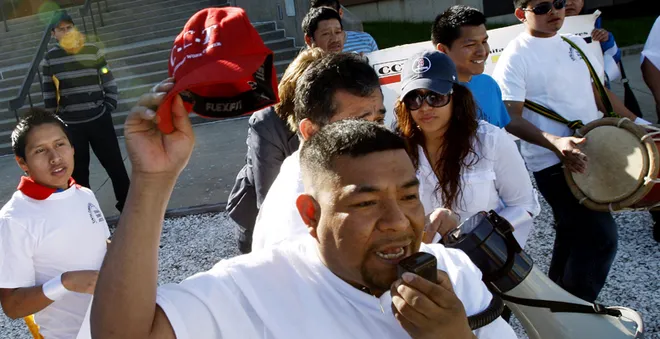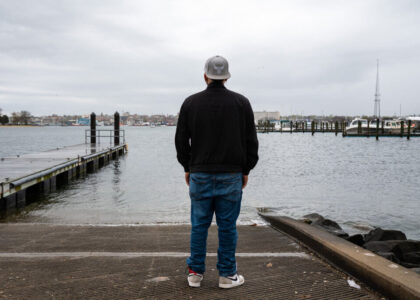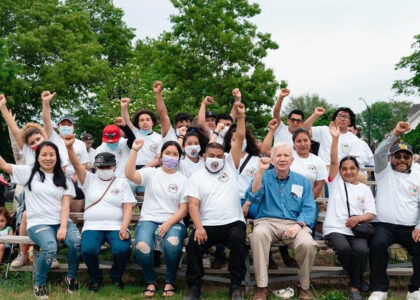NEW BEDFORD — Marlene Cerritos, 17, came to the United States from El Salvador atage 9. Her parents had come six years earlier, leaving Cerritos with her grandmother before she joined them in New Bedford.
“I learned English, I was a good student, but as I grew up I realized that I didn’t have the same rights as all the other children because I didn’t have my papers,” she said.
Cerritos was among 50 people at a May Day protest Wednesday in support of immigration reform. The protesters — mostly Central Americans with a sprinkling of U.S.-born activists — gathered in front of the Federal Building as immigrants banged drums and spoke through a bull horn.
Cerritos, who studies nursing at Greater New Bedford Regional Vocational Technical High School, belongs to the Student Immigrant Movement, a Massachusetts organization dedicated to the rights of student immigrants.
With the help of SIM, Cerritos received legal status for two years under an Obama-era policy affecting undocumented immigrants who came as children, which took effect in June.
But her own status is only part of Cerritos’ story. She said if her parents aren’t able to sort out their immigration status, they could be forced to return to El Salvador.
“And I don’t want to go back, because this is my country, and I would fight for this country and give my life for this country,” she said. “This country is where I grew up, and it’s the country I have learned to love.”
Between shouts of “Yes, we can,” and “The people united will never be defeated,” Adrian Ventura of Centro Comunitario de Trabajadores said immigrants are here to contribute to the economy.
“We’re not terrorists, we are good workers,” he said. “Let’s not be afraid — let’s not be scared.”
Luis Gomez, a Guatemalan and member of Student Immigrant Movement, said: “It has been a long fight. Immigration reform has been an issue that we’ve been fighting for many years now, so we’re here in support of that.”
José Soler, director of the UMass Dartmouth Labor Education Center, said he came to the march in support of the rights of immigrants and workers.
“Most of the immigrants are workers anyways,” he said.
Hailing from Puerto Rico, Soler noted that in 2006 the immigrant movement used May Day as a day of struggle — something common in most of the world.
“What the immigrant workers movement has done is also revive May Day as a U.S. holiday,” he said. “It’s not still recognized as a holiday but it’s brought it back onto the scene.”
Because Puerto Ricans are U.S. citizens, Soler said he considers himself both an immigrant and a non-immigrant.
“Yes and no,” he said. “Yes because I’m Puerto Rican. “¦ I’m from another nation.”
Asked why very few Puerto Ricans show up to events like this, Soler said there’s a division in the community.
“There’s those who don’t see it as their issue, and there are those of us who do, not because of our status but because they’re Latin Americans like we are.”
Joe Dias, a retired SEIU union member, said he came to the protest to call for justice, fairness and respect for immigrants.
“They’re good people, good workers, good citizens,” he said. “I consider them all citizens whether they’re documented or not. Our maker didn’t put us here with a paper.”




